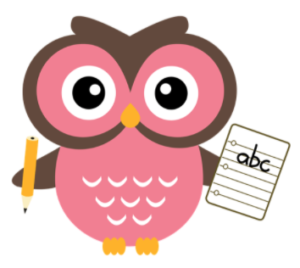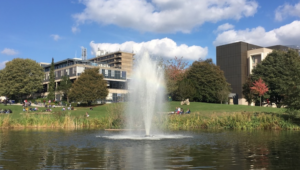 One of the most crucial things to remember whilst on placement is that you are still a University of Bath student. It is easy to get caught up in the novelty of your placement and disconnect yourself from your student-ship, especially if you're at a non-academically focused placement in a new environment. However, it is important to remember your student status for two reasons: the first being the support the University continues to offer you throughout this year, and the second being your assignments. Completing your assignments is fundamental to passing your year, and in the case of psychology the last two assignments do count towards your overall grade.
One of the most crucial things to remember whilst on placement is that you are still a University of Bath student. It is easy to get caught up in the novelty of your placement and disconnect yourself from your student-ship, especially if you're at a non-academically focused placement in a new environment. However, it is important to remember your student status for two reasons: the first being the support the University continues to offer you throughout this year, and the second being your assignments. Completing your assignments is fundamental to passing your year, and in the case of psychology the last two assignments do count towards your overall grade.
But fear not, for having completed these assignments myself, here's a comprehensive rundown of the different tasks psychologists have to complete on placement and my top tips for completing them. (If you're not a psychologist I'd recommend checking your Moodle page; speaking to your placement supervisor at Bath and any previous placement students for more information and guidance on the specific assignments you’ll be given. And just a quick note to say that all this information is correct this year, so please use this as a guide, knowing that things could always change in the coming years).
1. POLO/Initial Report
So within the first 6 weeks of your placement you have to complete your Personal Objectives and Learning Outcomes (POLO) form. This is a relatively long document with different sections for each skill-type under which you have to fill out your current competence and objectives for how you will develop this skill over your placement.
 My first piece of advice here is to remind yourself, amidst all the excitement of moving and starting your placement, that this assignment exists. Remember before you go on placement about this assignment and start filling it out gradually within the first six weeks of your placement until you've completed it. The start of your placement can be a really strange, nerve-wracking and exciting time and is probably the easiest time to forget the responsibilities of being a student. But this assignment is necessary to pass your year and also provides a useful layout for directing the course of your placement. By thinking about your goals and having them in this set format you may be able to discuss with your placement provider the types of tasks you'd like to complete in order to meet these objectives.
My first piece of advice here is to remind yourself, amidst all the excitement of moving and starting your placement, that this assignment exists. Remember before you go on placement about this assignment and start filling it out gradually within the first six weeks of your placement until you've completed it. The start of your placement can be a really strange, nerve-wracking and exciting time and is probably the easiest time to forget the responsibilities of being a student. But this assignment is necessary to pass your year and also provides a useful layout for directing the course of your placement. By thinking about your goals and having them in this set format you may be able to discuss with your placement provider the types of tasks you'd like to complete in order to meet these objectives.
Alongside your POLO form is the first reflective piece of writing you have to complete on placement. This is your Initial Placement Report, and for my cohort it was due on November 10th. 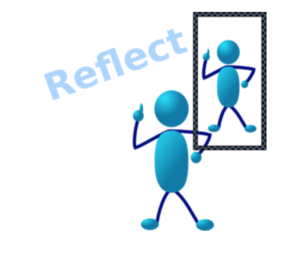 Again, remind yourself of this assignment from the start and maybe jot down ideas as you go for what you want to add to it. There’s a layout provided by past-reports and the placement department for you to follow, so all you need to do is reflect on your current placement experiences and sort your reflections (e.g. how you found the experience, what you learnt from it) into these different sections. This provides the perfect opportunity to reflect on the start of your placement and appreciate what your placement has helped you learn thus far, and what you want to get out of the rest of it. Adopting a method of reflective practice from the start of your placement can be really valuable in allowing you to grow from these new situations, as by reflecting on your feelings and actions you can learn to modify your behaviours if a similar situation were to occur again and thus feel more capable for handling these scenarios.
Again, remind yourself of this assignment from the start and maybe jot down ideas as you go for what you want to add to it. There’s a layout provided by past-reports and the placement department for you to follow, so all you need to do is reflect on your current placement experiences and sort your reflections (e.g. how you found the experience, what you learnt from it) into these different sections. This provides the perfect opportunity to reflect on the start of your placement and appreciate what your placement has helped you learn thus far, and what you want to get out of the rest of it. Adopting a method of reflective practice from the start of your placement can be really valuable in allowing you to grow from these new situations, as by reflecting on your feelings and actions you can learn to modify your behaviours if a similar situation were to occur again and thus feel more capable for handling these scenarios.
2. Dissertation work
One of the most advantageous aspects of a psychology placement at Bath is the fact that you need to collect your data for your dissertation whilst on placement. Though this can be daunting, it actually provides you a great opportunity to be more inquisitive during your placement and really delve into the purpose of the research/work you're already doing.
For more details on dissertations check out my previous two blogs on them:
https://blogs.bath.ac.uk/students/2021/07/15/dissertation-difficulties/ and https://blogs.bath.ac.uk/students/2021/02/25/diss-errr-tation-time-come-on/
 But for now I will just stress the importance of getting on top of your ethics ASAP. The ethics form can be long and you may have to submit multiple different forms to get ethical approval from both the university and your placement provider, so the sooner you get this in the better. This means having your dissertation study ready to roll out, as your ethics is essentially breaking down how your study is ethical and thus you need your study, what it is, the questions in it etc. all ready beforehand. So maybe after you’ve settled and gotten your initial report done, start digging around in your placement for an idea for what your dissertation topic will be. Ask questions, see what other students have done before, see if there’s anything different about your placement to previous years and if you can use that for your dissertation. Then once you’ve got your topic, start planning the type of study you’ll use and get in contact with the research/ethics department from your placement provider as well as your dissertation supervisor to get the ball rolling. After all, the sooner you get your ethics through the sooner you can start collecting your data and the sooner you can really begin to work on your dissertation.
But for now I will just stress the importance of getting on top of your ethics ASAP. The ethics form can be long and you may have to submit multiple different forms to get ethical approval from both the university and your placement provider, so the sooner you get this in the better. This means having your dissertation study ready to roll out, as your ethics is essentially breaking down how your study is ethical and thus you need your study, what it is, the questions in it etc. all ready beforehand. So maybe after you’ve settled and gotten your initial report done, start digging around in your placement for an idea for what your dissertation topic will be. Ask questions, see what other students have done before, see if there’s anything different about your placement to previous years and if you can use that for your dissertation. Then once you’ve got your topic, start planning the type of study you’ll use and get in contact with the research/ethics department from your placement provider as well as your dissertation supervisor to get the ball rolling. After all, the sooner you get your ethics through the sooner you can start collecting your data and the sooner you can really begin to work on your dissertation.
3. Placement poster
In your second semester you will then have to complete your placement poster. For us this was due on the 26th April and thus did coincide with some dissertation work, so being able to prioritise your time to handle these various assignments is important, and scheduling certain hours for different tasks can help with this.
The poster has a general template on PowerPoint that you can work from, and there's lots of information on what to include on it, so it's just up to you to get creative. This assignment was definitely one of my favourites throughout the year as it provides you an opportunity to display your placement work when you're more in the thralls of it in a new and exciting manner. Using images and graphics as well as words to display what you've been doing for the past half a year can help you see your work in a new perspective and help you feel proud of what you've accomplished thus far. 
It’s important to remember that these posters are for a presentation you will be giving to the year below so make sure to settle on an appropriate, captivating and informative design. As the poster will be printed in A1 it’s also worth it to make sure that any images you use are able to scale up to this size without becoming blurry, and also to make sure that you can use this poster as the basis of a sales pitch for your work and placement provider.
4. Final POLO/Reflective Report/Research Proposal
Then towards the end of your placement you have your final assignments. These are your final POLO (which is not graded), your reflective report and dissertation research proposal (which are each individually graded and then their average is your year’s grade). For us all of these assignments were due on June 8th. As these are your final university assignments and as two of them are graded it’s definitely worth it to have some time set aside in which you can complete these to the best of your ability.
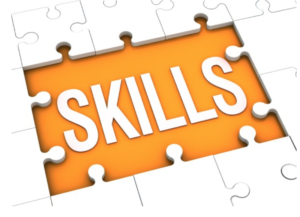 The POLO form is the exact same layout as the one you will have completed at the start of your placement, so I'd recommend using that one as a foundation for what you're filling out now. You're able to look at all the objectives you set and how you said you'd achieve them and match that with what actually occurred on your placement and the skills you gained. This assignment also provides the opportunity to set out more objectives for the final year of your degree, and in doing so you’re able to translate the skills you’ve acquired on placement to your university work and future career.
The POLO form is the exact same layout as the one you will have completed at the start of your placement, so I'd recommend using that one as a foundation for what you're filling out now. You're able to look at all the objectives you set and how you said you'd achieve them and match that with what actually occurred on your placement and the skills you gained. This assignment also provides the opportunity to set out more objectives for the final year of your degree, and in doing so you’re able to translate the skills you’ve acquired on placement to your university work and future career.
Then there’s your final reflective report. This assignment is worth 50% of your year's grade and thus taking the time and energy to complete it well is important.  As I mentioned before adopting a method of reflective practice during your placement can be really beneficial for allowing you to process the new experiences you have and your reactions to them in order to develop more positive reactions and attitudes towards these situations. So whenever you do experience something new and challenging it could be worth it to write a bit about it at the time and then when it comes to writing your final reflective report you have already got a list of reflections from your placement that you can use as a basis for this assignment. Then there's guidance on the format of this report, and with some research into different reflective models you should be good to go.
As I mentioned before adopting a method of reflective practice during your placement can be really beneficial for allowing you to process the new experiences you have and your reactions to them in order to develop more positive reactions and attitudes towards these situations. So whenever you do experience something new and challenging it could be worth it to write a bit about it at the time and then when it comes to writing your final reflective report you have already got a list of reflections from your placement that you can use as a basis for this assignment. Then there's guidance on the format of this report, and with some research into different reflective models you should be good to go.
And last but definitely not least is your dissertation research proposal. Again getting ahead on this can really save you in the long run, especially as you'll be needing to do work on your dissertation to get your ethics approved. Thus during this time it could be worth it to start plotting out the rationale for your study, as well as your methodology etc. into the format of a proposal as then you'll already have the basis for your study ready to sell to your supervisor and ethics committees, and then when it comes around to this assignment all you have to do is make sure it fits the required format and you're basically already done. This assignment is also worth 50% of your grade, so making sure you’ve thoroughly researched all your points, have included substantial references and have a strong rationale for your study can really be beneficial in securing a good grade this year, as well as proof reading before you send it off.
+ various other tasks
Aside from these assignments you may also be required to complete other tasks set by your placement provider, or to complete an additional course via your placement, or for funding purposes. 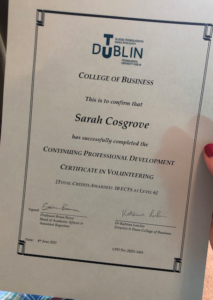 Thus being able to organise and prioritise your time wisely can really help in allowing you to do as well as you can in these various assignments whilst still taking the time to look after yourself and not become overwhelmed. These assignments aren’t here just to stress you out, but are genuinely designed to help you reflect on your experiences so that you understand the merit of your placement and how by seeing what you’ve gone through and how you’ve adapted to these new situations you are able to grow and become even more proficient in the skills you’ve gained. So remember to enjoy your placement, and to reflect on what you’re doing there as much as possible and then you will find it far easier to complete these assignments as you will just be recounting what you already have discovered.
Thus being able to organise and prioritise your time wisely can really help in allowing you to do as well as you can in these various assignments whilst still taking the time to look after yourself and not become overwhelmed. These assignments aren’t here just to stress you out, but are genuinely designed to help you reflect on your experiences so that you understand the merit of your placement and how by seeing what you’ve gone through and how you’ve adapted to these new situations you are able to grow and become even more proficient in the skills you’ve gained. So remember to enjoy your placement, and to reflect on what you’re doing there as much as possible and then you will find it far easier to complete these assignments as you will just be recounting what you already have discovered.
If you have any questions about these assignments feel free to leave a comment and I'll get back to you ASAP!
Respond
